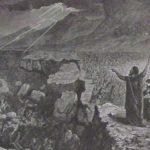We run our website the way we wished the whole internet worked: we provide high quality original content with no ads. We are funded solely by your direct support. Please consider supporting this project.

The Twist that Reframes the Whole Story
Many people read the Bible as if everything written within it is equally authoritative. As a result, people read it along the lines of a cookbook. Like a recipe, the meaning and authority of a passage aren’t much affected by where the passage is located within the overall book. The truth, however, is that the Bible is not at all like a cookbook. It’s a story, along the lines of a novel. And it’s a story with a very surprising twist.
The Bible could be compared to the movie The Sixth Sense, starring Bruce Willis. In it, the last few minutes reveals an unexpected twist that requires you to rethink every single thing that took place previously. The whole Old Testament leads up to, and is fulfilled in, Jesus the Messiah. But the particular way Jesus fulfills it reframes everything. Hardly anyone saw this coming! In fact, Jesus completes the story of God’s dealings with Israel in a way that was so unexpected, most who were looking for the Messiah couldn’t accept him once he came.
For example, most Jews were looking for a Messiah who would reinforce Israel’s status as God’s favored nation by leading a revolt against its oppressors (the Romans) and reinstating it as a sovereign nation. Jesus instead turned Jewish religious nationalism on its head. His message inaugurated a kingdom that included “outsiders” (gentiles) and his way was one of loving enemies instead of revolting against them.
In fact, not only does Jesus not lead people in a military conquest over their enemies, he allows himself to be executed on a cross to reveal God’s profound love for enemies. And in this scandalous and unexpected action, his followers discerned the ultimate revelation of God’s true nature. With his life, ministry, teaching, and especially his sacrificial death, Jesus provided a picture of God and his kingdom that forces us to reframe everything that led up to him.
This means that we should read the Old Testament through the lens of the revelation of God in Christ, and especially through the lens of the cross, which sums up everything Jesus was about. This is how Jesus himself suggested we should read the Scripture when he taught that all Scripture is about him (Luke 24:25-27; John 5:39-47). It is also implied by Paul’s teaching that the Spirit has removed the “veil” over our “hearts” and “minds” (2 Cor 3:14-16) so that we can now see the “glory of God shining in the face of Jesus Christ” as we read Scripture. And it’s reflected in the way various authors of the New Testament read the Old Testament. In sharp contrast to the common teaching of modern evangelicals that Bible interpreters should always stick to the “original intended meaning” of a passage, the way New Testament authors use the Old Testament reflects little concern with this. Their primary concern was rather to see how it points to Jesus.
—Adapted from Benefit of the Doubt, pages 176-183
Photo credit: HckySo via VisualHunt.com / CC BY-NC
Category: General
Tags: Bible, Bible Interpretation, Cruciform Theology, Jesus
Topics: Attributes and Character
Related Reading

Uncrossed
Did any of you catch SNL this weekend? They did a parody of Tarantino’s DJango Unchained called DJesus Uncrossed. Many were deeply offended by the depiction of Jesus in this, but David R. Henson blogged about how this skit revealed what we’ve already been doing for quite a while as a culture. In his blog…

Do the Gospels Fabricate Prophetic Fulfillment?
Skeptically-inclined scholars, and especially critics of Christianity, frequently argue that the Gospel authors created mythological portraits of Jesus largely on the basis of OT material they claim Jesus “fulfilled.” In other words, they surveyed the OT and fabricated stories about how Jesus fulfilled those prophecies. In response, it’s hard to deny that there are certain…

Four Principles of the Cruciform Thesis
In the second volume of Crucifixion of the Warrior God, I introduce how four dimensions of the revelation of God on the cross (as introduced in this post) lead to four principles that show us how to unlock aspects of the OT’s violent divine portraits and thus disclose how a given portrait bears witness to…

Why Racial Reconciliation Matters
In Psalm 72, the author prays for a day when “all kings” would “bow down” to God’s anointed and when “all nations” would “serve him” (vs. 11). At this time, the Psalmist continues, God’s king will deliver “the needy who cry out” and save “the afflicted who have no one to help.” He will “take…

Podcast: Where Does Forgiveness Fit in a Cruciform Theology?
Greg offers looks at forgiveness in a realm of natural consequences. http://traffic.libsyn.com/askgregboyd/Episode_0298.mp3

Are You Fully Alive? Here’s the Key
Image by rashdada via flickr. The cross reveals the full truth about us. This truth reconnects us with our true source of life, which in turn heals our idol addictions. This dimension of the cross is frankly so breathtakingly beautiful that, so far as I can tell, very few followers of Jesus have ever really grasped it.…
